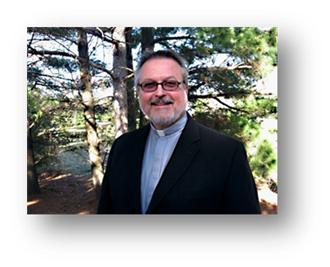“What Did You Give Up For Lent?” (by Rev. Fr. Yanchy Lacska)
Growing up in a Roman Catholic family in the 1950-60s meant abstaining from meat every Friday. I still remember nostalgically those Friday night suppers of fish sticks or tomato soup with grilled cheese sandwiches. But during Lent, in addition to our meatless Fridays, our family tradition was to abstain from sweets except fruit. This meant six weeks with no candy, soda pop, cake, pie, or anything that was dessert-like. Even though sugary treats were not as available to us as they are for kids today, it seemed to me to be a huge sacrifice. If I complained or grumbled, I was told to offer up my suffering for the poor souls in Purgatory.
There are of course, potentially good reasons for giving something up for Lent, whether sweets, or meat, or adult beverages. This practice could be beneficial for one’s health, or, as Sr. Joan Chittister has written, can act as a show of solidarity with those who are hungry around the world.
I do worry, however, that there is potentially an unconscious danger behind abstinence and fasting. This hidden message is that our sensual human nature, our bodies, and the good things of mother earth are bad and somehow in opposition to our soul and to God. The Council of Trent in the sixteenth century validated this idea when they determined that the “world, the flesh, and the devil” were “implacable enemies of the soul.” A current online source on fasting during Lent stated, “Fasting helps us to be detached from the things of this world.”
This division between the physical world and the spiritual is currently expressed when someone says, “We are not physical beings having a spiritual experience, we are spiritual beings having a physical experience.” I recently came across this statement again, in a book on meditation. The author spends several pages explaining the importance of fasting in order to develop our true spiritual self.
While Jewish teachings (remember, Jesus was a Jew) include days of fasting, they also emphasize the body and soul in harmony. The body is seen as a gift from God to be cared for and tended. According to Rabbi Rami Shapiro, the danger in thinking we are either spiritual beings having a physical experience or physical beings having a spiritual experience reinforces and continues the illusion of dualism. Rabbi Shapiro wrote, “Physical goes with spiritual the way front goes with back and up goes with down.” (Spirituality and Health Magazine, Spring 2015)
Celtic Christianity also teaches an embodied spirituality. That is not to say that the early Celtic Christians didn’t fast or employ practices of self-discipline as a means of focusing on the Divine, but Celtic spirituality trusts the senses and the promptings and stirrings from the body. Ninth century Celtic teacher, John Scotus Eriugena, like Jewish scholars, taught that being human consists of a body and soul bound together into a single harmony. Celtic Christians see the human body, sanctified by the Incarnation of Christ, as an integral part of the human person and our human enjoyment of food and drink and the sensual are good.
Our bodies are holy. Instead of trying to separate our soul from our body, we should follow the insight of twelfth century teacher and mystic, Hildegard von Bingen, who wrote, “Holy persons draw to themselves all that is earthy.” Instead of denying our body during Lent through abstaining or fasting, perhaps we should learn to appreciate and honor our bodies through practices like qigong or yoga, eating more healthy organic foods, or getting a massage. Perhaps we should join our Jewish sisters and brothers in praying the Asher Yatzar :
Blessed are You, Source and Substance of All Reality,
Who fashions me with wisdom,
And blesses me with a body of wondrous balance.
I honor Your gift by honoring my body and cultivating its promise.
Blessed are You, Healer of all flesh,
Who blesses me with form and function.
Amen.

Rev. Fr. Yanchy Lacska, Ph.D. is an Orthodox Catholic priest, an interfaith minister and a Jungian oriented pastoral counselor. He has been a hospital chaplain, a college professor, psychotherapist, and has taught qigong for 20 years.

Thank you for a beautiful lesson filled with wisdom.
You are very welcome Denise. May you have a very blessed Lenten season.
Yanchy
Rev. Yanchy:
Thank you for sharing this beautiful lesson with us. I remember giving up candy for Lent which was very difficult as a child. As an adult, who loves Jesus with all my heart rather than fearing hell, I think of Lent as a spiritual journey helping us to get closer to Jesus through prayer and giving to others.
Kathleen Griffin
Beautiful, thankyou, Yanchy! So long since I have seen you and your family. Hope that you weathered the pandemic. I remember so many “failures” with giving up goodies for LENT and gradually learning that it is the spirit that is getting closer to God and Jesus and that adding new studies and prayers and reading is what makes my Lent meaningful.A friend sent me a book “Wrestling the Light” by Ted Loder, a Methodist Minister who was new to me. It is wonderful and providing me with many Lenten lessons. Also, the war in Ukraine is brimging home many, many lessons,
Really missing you at McCabe, Love and Prayers,Chris